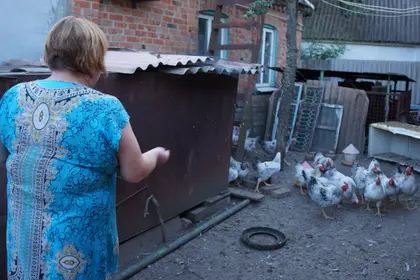Myroslava will never forget the day the Russians fired phosphorus munitions on them – an act that’s counted as a war crime in civilian areas.
“We were sitting with my mother back then, watching. And I said, ‘Oh my God, who would think of launching fireworks?’ And then people started saying that the Russians had started using phosphorus bombs,” Myroslava said of the day, May 13, 2022.
JOIN US ON TELEGRAM
Follow our coverage of the war on the @Kyivpost_official.
“That was the first time we saw them. And the cluster munitions – even earlier. They had struck our house 18 times,” she said.
Myroslava, 37, lives with her 11-year-old son Tymofiy and 64-year-old retired mother in a frontline village in the Orikhiv district, Zaporizhzhia Region (all the names of our interviewees have been changed at their request).
Kyiv Post spoke to Myroslava and Tymofiy by phone. Throughout the conversation explosions were heard on and off in the receiver – some quieter, some louder.
Every morning the family wakes up to the sounds of artillery fire.
“It is mostly when our guys start shooting. We can sleep from about 12 a.m. to 4 a.m. I wake up when either the Vilkha (a Ukrainian heavy multiple rocket launcher that fires guided missiles) or the cannons start shooting. From one side or the other of the house,” Myroslava said.
She and her child mostly sleep on the floor, while her mother sleeps on the sofa in the back room.

G7 Deal on $50 Billion Ukraine Loan Seen in October, Gentiloni Says
“There are a lot of windows in the house. I started sleeping on the floor with my child after a cluster munition struck in October and two fragments pierced through the window and got stuck in the wall above the couch where I used to sleep. I feel safe when I sleep on the floor,” she said.
“Usually, I wake up very, very early. At half past five I'm already on my feet. I know that I need to switch on the generator, charge my gadgets, and do the housework. I walk the dog in the morning, get breakfast ready for my son and mother.”
Myroslava's pug. Photo: Sasha Sil.
Now Myroslava is preparing food for the winter.
“We've harvested potatoes, onions, all sorts of herbs. The cucumbers are ripe. We’re still waiting for the tomatoes and beetroots. And if we were to leave, who would feed children (in the village)?”
There are still shops in the village, but the family eats mostly their home-grown vegetables.
“It's still better to have your own. Because you can still make preserves from your own produce. Yes, sometimes if you’re missing something you can buy it. But only some things, you can't buy everything."
In August, a missile struck Myroslava’s vegetable garden, she said.
“It was most likely a high-explosive fragmentation shell. It hit my garage, the house and the yard. Fortunately, there was no one in the garden at that moment. I was in the house with my son and my mother was feeding the chickens.
Damage to Myroslava's house from Russian shelling. Photo: Sasha Sil.
Myroslava gets very afraid when shells fly over her house.
“When our soldiers are shooting, I know there will be a response. And sometimes the response comes very quickly. Debris flies over the rooftops... I will say this – we pray for our military and for the people who are staying here.”
Myroslava recalls her feelings at the beginning of Russia’s full-scale invasion. She felt intense fear and a complete lack of understanding of the chaos that was happening around her. Then she started to orientate herself with the sounds – began to distinguish between the exit and arrival of a shell.
“But sometimes the explosions sound so unexpectedly that I’m literally jolted while walking in the yard. I can't say I'm not afraid. To say that I'm used to it? No, I'm not used to it. But I'm more anxious than my child is. My son says: ‘Mom, calm down. This is the sound of our guys. Mom, calm down, it's just the way the equipment works. Mom, that's all it is, they're shooting from there,” Myroslava said.
She recalls an episode when the Ukrainian army was carrying out an intense counteroffensive operation against Russian occupation forces for three days.
“It was especially scary when our guys decided to fight the Russians hard. They did, and for three days everything was shaking. And we would shake and pray. We slept in the shower, where there are no windows and nothing’s made of glass. With the door open. Because otherwise it could have been torn out by the blast waves.”
“One of my relatives told me that I should leave my mother because she had ‘outlived her time,’ that I should take my child and leave.”
Myroslava is raising Tymofiy alone. Her father died of a stroke and her mother suffers from joint problems.
“It happened once that she tripped and broke her ribs. How could I leave her alone in a time like that – what kind of daughter would I be?”
Myroslava's mother does not want to leave her home. Even though relatives from Odesa and Poltava have been inviting the family to stay with them.
“But good relatives are only good until you’re living with them for a while... My idea of family is either everyone leaves, or no one leaves. If [my mother] had a husband, I might have left with my child. I won't leave her, no matter what. It's either everyone or no one,” Myroslava said.
“One of my relatives left for Germany during the full-scale invasion. She started telling me that I should leave my mother because she had ‘outlived her time,’ that I should take my child and leave. My point of view is that this is very cynical. I understand that this is everyone's choice. But I can't leave.”
“On Feb. 24, we went to school, and then we were immediately evacuated. Some people on the bus were crying, some were laughing.”
Photo: Sasha Sil.
Myroslava tries to spend almost all of her time with her son, who has a disability.
“I try to devote myself completely to my child. I play with him. He helps with the housework, cooks, cleans. My child has even started helping ladies with their manicures!” she said.
Tymofiy turns 12 soon. He is now studying remotely and said that he doesn’t feel isolated from his peers.
“I have Telegram, and that's how I communicate,” he said. “I want to be proud that I was here from the beginning (of the full-scale Russian invasion) to the end. You just have to live through it. Everything will be fine afterward.”
Feb. 24, 2022 was the last day Tymofiy went to school. That day, the children were pulled out of classes and brought home, Tymofiy said.
“On Feb. 24, we went to school, and then we were evacuated immediately. Someone on the bus was crying, someone was laughing. I didn't understand what was happening at all.”
Photo: Sasha Sil.
Tymofiy’s school was destroyed by Russian shelling.
“When the school is rebuilt, I want to look at my classmates, who will be 2 meters tall... I haven't changed, but they will have changed completely,” he said, joking.
“You can't see yourself that way though. You have changed a lot,” Myroslava said, sadness evident in her voice.
From time to time, Myroslava and Tymofiy talk about the war that’s happening all around them. Most often, they talk about the situation at the front lines. They constantly monitoring Ukraine’s progress.
“We follow it very closely. Timka (the diminutive of Tymofiy) gets up in the morning and runs and downloads the news. And then, ‘Mum, check it out! Verbove (was liberated), Robotyne (was liberated),’” Myroslava said with a laugh.
“War is a challenge. There will be devastation. And we will have to rebuild everything. And, yes, I'm ready,” the 11-year-old said.
You can also highlight the text and press Ctrl + Enter










